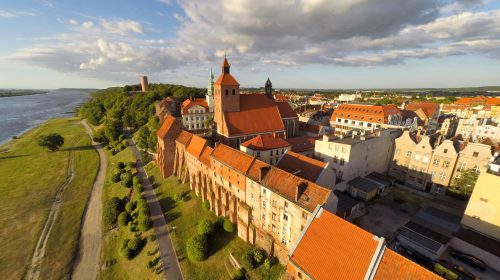Aleksander Ścibor-Rylski was born on 16 March 1928 in Grudziądz.
He was a Polish scriptwriter and Director. He also fought in an underground paramilitary organisation called Szare Szeregi (The Grey Ranks) and Armia Krajowa (The Home Army), and also participated in the Warsaw Uprising. Between 1948 and 1954 he was a member of the editorial team of Żołnierz Polski/Polish Soldier weekly, where he acted in a number of capacities, including the Head of the Culture Desk. From 1955 to 1957, he was one of the editorial staff of the Nowa Kultura/New Culture periodical. In 1950, he published a socialist realist novel entitled Węgiel/Coal, which secured his position as the most-talented writer of this genre.
His adventure with the cinema began in the 1950s. He is the author of the screenplays for the outstanding masterpieces by Andrzej Wajda Człowiek z żelaza/Man of Iron, Człowiek z marmuru/Man of Marble, and Popioły/The Ashes, as well as for Lalka/The Doll, directed by Ryszard Ber in 1977, considered to be one of the best Polish television series in history.
In 1951, he wrote his first script for a short documentary film entitled Matrosowcy, which depicted the new working methods at a shoe factory in Radom. The picture was a communist propaganda film. Five years later, Ścibor-Rylski wrote the script for his first feature film, entitled Ziemia/Land by Jerzy Zarzycki. In the same year, he also created the screenplay for an action social-drama film entitled Cień/Shadow by Jerzy Kawalerowicz, and – two years later – to Ostatni strzał/The Last Shot by Jan Rybkowski.
In 1976, he wrote the script for a Polish-Norwegian picture Dagny, directed by Haakon Sandoy. It is a biographical story about the last nine years in the life of Dagny Juel – life partner of Edvard Munch, August Strindberg and Stanisław Przybyszewski, the last of whom she eventually married, and with whom she had two children. One of the supporting roles was played by a Toruń native, Bogusław Linda.
Ścibor-Rylski was not only a scriptwriter, but also an independent Director. He debuted in 1963 with the film entitled Ich dzień powszedni/Their Everyday Life – a story about a love triangle. The cast included many A-list actors and actresses of that time, such as Zbigniew Cybulski, Aleksandra Śląska, Pola Raksa, Barbara Krafftówna and Barbara Brylska. His next picture was Późne popołudnie/Late Afternoon – a psychological portrait of a woman who is unable to come to terms with the inevitability of old age, seen through the eyes of her adolescent daughter. He then wrote the script for Jutro Meksyk/Mexico Tomorrow – a 1965 psychological-drama film about professional athletes. In this picture, Zbyszek Cybulski once again worked with Rylski and played the leading role of a coach. 1967 saw the creation of a psychological action-drama film – Morderca zostawia ślad/The Killer Leaves a Trace – about a search for a criminal who committed murder in the last hours of the occupation, at the same time stealing a file of Gestapo collaborators. One year later, he directed Wilcze echa/Wolves’ Echoes – a picture about the post-War clashes between the Polish army and the communist-era police, against the Ukrainian underground.
The last film directed by Rylski was Sąsiedzi/The Neighbours in 1969. Filmed in the city centre of Bydgoszcz, it depicts the events of the so-called Bloody Sunday and the mass murder of Poles living in Bydgoszcz, committed by the Germans in September and October 1939.
Between 1955 and 1965, Rylski was the literary Director of the Zespół Filmowy Rytm film studio, and between 1972 and 1978 – the Artistic Director of the Zespół Filmowy Pryzmat film studio. Under his direction, Zespół Filmowy Rytm created, among other works, the first comedy films by Stanisław Bareja, the first screen adaptation of the adventures of Pan Samochodzik (Mister Automobile), and Popioły/The Ashes by Wajda, as well as films by Stanisław Jędryka, Jan Rybkowski, Jerzy Lenartowicz and Stanisław Różewicz. In turn, during his work at Zespół Filmowy Pryzmat, the studio produced popular television series, such as Karino, Polskie drogi/Polish Roads and Lalka/The Doll, as well as films by Janusz Zaorski, Andrzej Kondratiuk and Janusz Morgenstern.
After the death of Aleksander Ścibor-Rylski, his book entitled Pierścionek z końskiego włosia/The Horse-Hair Ring served as the basis for an Andrzej Wajda picture entitled Pierścionek z orłem w koronie/The Ring with a Crowned Eagle.
Selected filmography
Director
- 1963 – „Ich dzień powszedni”/„Their Everyday Life”
- 1964 – „Późne popołudnie”/„Late Afternoon”
- 1965 – „Jutro Meksyk”/„Mexico Tomorrow”
- 1967 – „Morderca zostawia ślad”/„The Killer Leaves a Trace”
- 1968 – „Wilcze echa”/„Wolves’ Echos”
- 1969 – „Sąsiedzi”/„The Neighbours”
Screenwriter
- 1951 – „Matrosowcy” dir. Roman Banach
- 1956 – „Cień/Shadow” dir. Jerzy Kawalerowicz
- 1958 – „Ostatni strzał”/„The Last Shot” dir. Jan Rybkowski
- 1958 – „Pigułki dla Aurelii”/„Pills for Aurelia” dir. Stanisław Lenartowicz
- 1961 – „Komedianty”/„The Comedians” dir. Maria Kaniewska
- 1962 – „Czarne skrzydła”/„Black Wings” dir. Ewa Petelska, Czesław Petelski
- 1965 – „Popioły”/„The Ashes” dir. Andrzej Wajda
- 1974 – „Gniazdo”/„The Nest” dir. Jan Rybkowski
- 1976 – „Człowiek z marmuru”/„Man of Marble” dir. Andrzej Wajda
- 1976 – „Dagny” dir. Haakon Sandoy
- 1977 – „Lalka”/„The Doll” dir. Ryszard Ber
- 1981 – „Człowiek z żelaza”/„Man of Iron” dir. Andrzej Wajda
Selected awards and distinctions
1979 – The Team Award of the Head of the Committee of Radio and Television – for Lalka/The Doll, etc.



